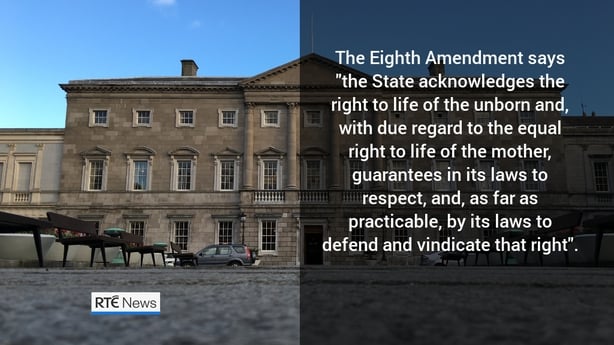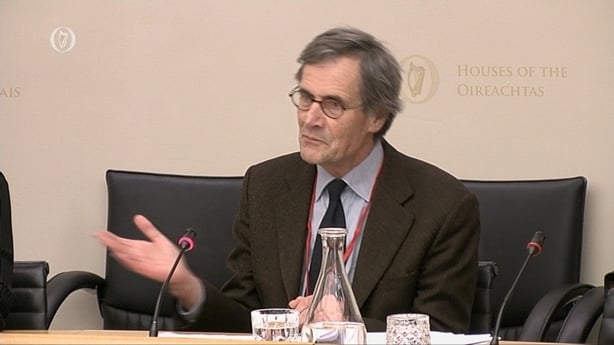The number of babies born with Down Syndrome in the Netherlands has not decreased with the introduction of prenatal screening, an Oireachtas committee has heard.
That is according to Eva Pajkrt, a Professor of Obstetrics at the University of Amsterdam, who is before the Oireachtas Eighth Amendment Committee.
She was addressing concerns expressed by Fine Gael TD Peter Fitzpatrick that screening would result in fewer babies with Down Syndrome being born.
Prof Pajkrt said while there has been an increase in uptake of prenatal screening because women are generally older when having children, 250 babies are born in the Netherlands every year with Down Syndrome.
We need your consent to load this Oireachtas TV contentWe use Oireachtas TV to manage extra content that can set cookies on your device and collect data about your activity. Please review their details and accept them to load the content.Manage Preferences
Earlier, Prof Pajkrt told the committee that there has been a 40% uptake since the prenatal screening programme, which establishes whether babies have defects, since its introduction in 2007.
Responding to questions from the Fine Gael Senator Jerry Buttimer, Professor Pajkrt said women are asked if they wish to be screened for chromosome abnormality (Down Syndrome, Edwards syndrome and Patau syndrome) and if they do want it, the answer has to be affirmative.
Non-invasive prenatal screening is available in the Netherlands since April this year, and while it detects foetal triscomies, she said that it lacks the ability to see other problems in foetus at an early stage.
There is a 95% uptake for the 20 week scan in the Netherlands.
Independent Senator Ronán Mullen challenged the professors appearing before the Committee on the Dutch abortion laws.
Mr Mullen put it to the the witnesses that the system in the Netherlands is abortion on request.
Prof Pajkrt said she had never come across a woman who makes the request for an abortion lightly.

She said the decision is very difficult and abortion on request is a bigger argument when women are facing problems like financing and housing.
"It's not a light decision", she said.
Mr Mullen said no one claimed abortion is a light decision and most people would acknowledge it is a crisis.
"Isn't it the case you only see one life to be protected as long as the abortion is wanted," he asked.

Professor Sjef Gevers, Emeritus Professor of Health Law with the Academic Medical Centre at the University of Amsterdam, said they had a duty of care following due process.
Asked by the Sinn Féin Senator Paul Gavin why abortion figures are so low in the Netherlands Prof Pajkrt said things could be better and in her view protection should be free.
However, she noted that sexual education in the Netherlands is mandatory which has helped.
The Committee was also told that in 2015 13% of abortions carried out in the Netherlands were on women from a foreign country. 34 of the women were from Ireland.
Committee told about Dutch abortion law
In their opening statement, the two professors said that since 2000 there has been a slight decrease in the number of abortions performed in the Netherlands.
However, they pointed out that 2015 that figure rose slightly.
One of the arguments for that, according to Prof Gevers, is due to fact that since up until 2011, contraceptives have always been reimbursed for every woman with insurance.
For the last six years, only women up to 21 years get reimbursement.
Abortion is free for everyone who is legal and insured in the Netherlands and is subsidised care. The costs are not reimbursed by the insurance companies but paid for by the Ministry of Health.
For foreigners or people living illegally in the Netherlands costs vary between €380 and €940.
The Committee heard that since 2012, the provision of sexual education to all school going children around the age of ten is mandatory.
Terminating a pregnancy is a crime under Article 296 of the Dutch Penal Code.
However, abortion will not be punished if carried out by a doctor in a hospital or abortion clinic with a license in accordance with the Dutch Termination of Pregnancy Act.
The act was adopted in 1981 (and came into force in 1984), "after a long history and more than ten years of public and political debate".
Prof Gevers said abortion is not seen as a routine medical procedure but one that may be carried out on the request of a woman if her circumstances leave her with no other alternative.
Basically, he said the Act does not provide substantive reasons or criteria for terminating a pregnancy.
"Instead, it sets standards in the form of a set of requirements designed to guarantee that the decision to terminate is taken with all due care".
Dutch law is different from many other countries in Europe in that it makes no further distinction between the first and second trimester of pregnancy.
There is only one exception to this - abortion clinics need special licence to perform an abortion after the 12th week of pregnancy.
This provision is not based on the view that in that stage of development the foetus deserves more legal protection than in the previous stage, but on the observation that after 12 weeks gestation an abortion is more invasive, both psychologically and medically and that special skills and methods may be required to perform it safely.

